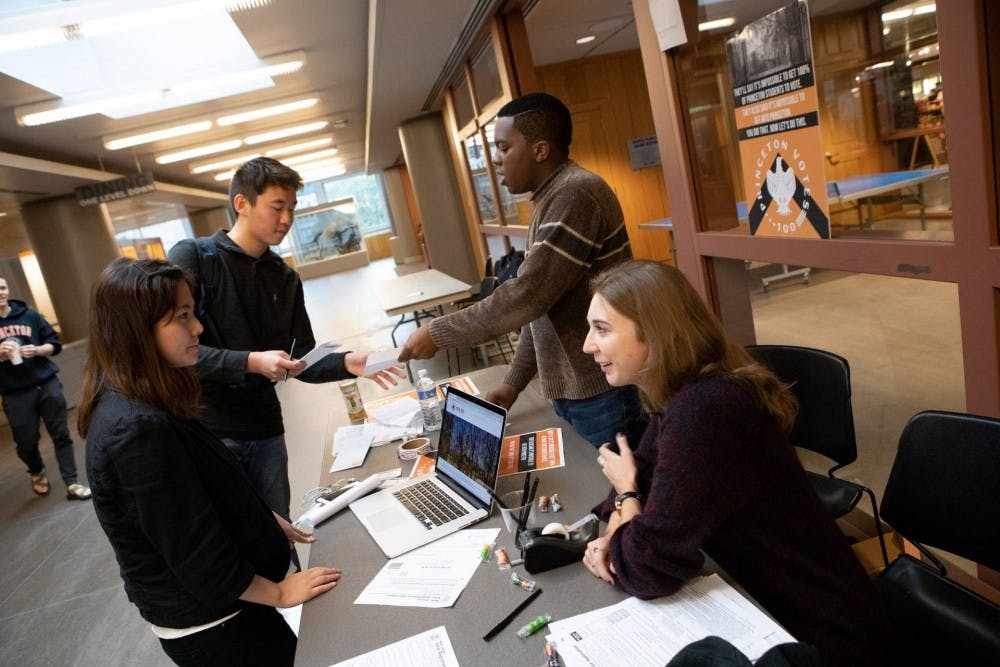During the last midterm elections, fewer than 15 percent of students aged 18–21 showed up to the polls. “Vote100,” a student-run initiative, has set out to change that, working to inspire civic engagement among University students.
Sponsored by the Office of the Dean of Undergraduate Students, the Undergraduate Student Government, and the American Whig-Cliosophic Society, Vote100’s goal was for every undergraduate student to take a pledge to vote in the 2018 midterms and in all future elections.
According to Thomas Dunne, Deputy Dean of Undergraduate Students, the Vote100 initiative operated mostly on social media, but it also held on-campus events, handed out information to students in person, and stationed a table in the Frist Campus Center.
“If there’s anybody who should be voting in every single election, it’s Princetonian[s],” Dunne said.
Dunne also added that although the Vote100 and other programs had conducted similar awareness initiatives or hosted watch parties during presidential elections, this was the first year Vote100 and ODUS made a civic engagement of this magnitude for a midterm election year.
According to a report from the National Study of Learning, Voting, and Engagement at Tufts University cited on the Vote100 website, 18 percent of college students and 12 percent of undergraduate students aged 18–21 voted in 2014.
As of 9:30 p.m. on Nov. 4, according to Vote100’s website, 29 percent of undergraduates took the pledge. Vote100 will be compiling its data after Tuesday’s elections, and The Daily Princetonian will report on that data.
The Vote100 initiative formally began on Sept. 13, when it held a “Stand-Up & Vote” comedy show in Richardson Auditorium hosted by comedian Mike Birbiglia and featuring rapper and comedian Jean Grae, author John Hodgman, and “The Daily Show” correspondents Ronny Chieng and Roy Wood Jr.

“The Daily Show” correspondent Hasan Minhaj was expected to headline the event, but canceled last minute. To the excitement of many students in the audience, Jon Stewart filled the vacancy.
Hailey Colborn ’22, a member of the Vote100 Student Leadership Team, received an email from Vote100 the day before classes started, inviting her to get involved with the group. Colborn has advocated for voter registration on other platforms, speaking at a DoSomething.org event at the University and distributing March for Our Lives voter registration t-shirts out of her dorm room.
Colborn acted as a grassroots advocate for Vote100, talking about the organization with her friends, sending the pledge to her peers, and posting about Vote100 on social media platforms, including on her Instagram profile, which has 16,800 followers.
“In all actuality, we don’t have a direct link to our government. There’s no way to guarantee that a politician is going to do what’s best for their constituents,” she said. “The only thing we can do is vote and try to get good people in these positions in the first place.”

As to why Princeton students, and college students in general, do not turn out at the polls, Colborn referenced the image of University campus as an “Orange Bubble.”
“We really are so sectioned off, and we don’t have to worry about anything but college things, like getting into an eating club on the weekends and getting your assignments done for your classes on time,” Colborn said. “I think we need to realize that the world is bigger than just Princeton and the world is bigger than what we interact with on a day-to-day basis.”
Dunne emphasized that the goal of the Vote100 program was not limited to this year’s midterm elections alone. The greater goal, said Dunne, was to make civic engagement a part of every students’ identity on campus.
“This is really about a long-term campaign to get Princetonians to believe that to be a Princetonian is to be a voter,” Dunne said.
Jonathan Haynes ’20, another Vote100 student leadership team member, noted that though iterations of on-campus voter advocacy have existed before, Vote100 is something different.
“Vote100 is unique because it’s a melding of students, administration, and USG in this really cool way in which everyone is coming together from different angles, respective angles,” said Haynes.
Haynes emphasized that civic participation is not viewed as a partisan issue by the members of the initiative.
“We’ve seen in the last few years, regardless of party or partisanship, the importance of holding onto the right to vote and promoting the right to vote in our society,” he said. “Now is just a really unique time in our society where everyone is on the same wavelength of the importance of civic engagement and voting. It’s just a great time to capitalize on that.”








